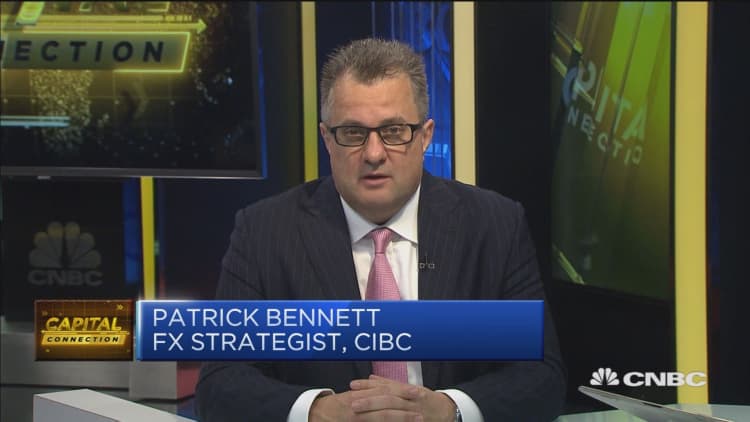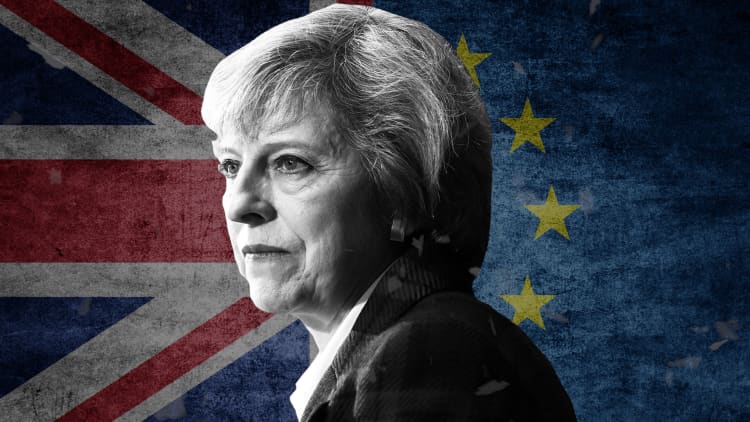U.K. Prime Minister Theresa May is facing a crunch series of votes this week that will determine the immediate course of Brexit and the U.K.'s relationship with the EU.
On Tuesday, lawmakers will vote for a second time on May's Brexit deal after initially rejecting it in January. If a simple majority of them don't approve the deal, they will then vote on whether they want to leave the 28-member bloc without a deal.

If they vote against a "no-deal" Brexit, they'll then have a vote on whether to extend Article 50 (which sets out the departure process) and delay Britain's departure which is currently set to take place on March 29.
May's deal initially failed to win enough approval in Parliament because of widespread opposition to a key part of the deal known as the "Irish backstop," an insurance policy designed to prevent a hard border between Northern Ireland and the Republic of Ireland if the EU and U.K. fail to strike a trade deal in a 21-month transition period post-Brexit.
Many lawmakers didn't like the fact that Northern Ireland could remain closely-aligned to the EU due to the backstop and that it had an indefinite nature. The U.K. would also need the EU's agreement to leave the backstop.

May and other Brexit officials have returned to Brussels to try to get concessions from EU leaders in the deal to allay the concerns of U.K. lawmakers but they refused, offering only reassurances that the backstop is seen by European officials as a last resort.
Now, the Brexit deal is to be put to MPs again on Tuesday March 12, although little appears to have changed.
Deal or no deal?
Here's a selection of expert opinion on whether the Brexit deal will pass muster this time, or whether it will fail, leading to a potential Brexit delay or a "no-deal" scenario.
"We suppose that Parliament's vote on March 12 will be another overwhelming rejecting of the negotiated deal, since the deal will be the same. Some theorize that with a "delayed Brexit" alternative now on the table, hardliners will vote in favor of what they call a "bad deal" rather than see Brexit delayed … We do not think MPs will be swayed by that."
Carl B. Weinberg, chief international economist at High Frequency Economics (Note, March 4).
"We currently don't expect the deal to go through when voted on next week, though it might be a closer outcome than in January. Some pro-Brexit MPs may decide to vote for the deal, but the same prospect of a delay that is leading them to soften their position will be seen as a positive development by some pro-remain members. Also, the fact the EU now knows the consequence of a defeat will be a delay has relieved the pressure on them to make more meaningful concessions on the backstop. A 2-3 month delay is our expectation, at the end of which a harder deadline would give the deal a much better chance of being approved."
John Wraith, the head of U.K. rates strategy and economics at UBS, told CNBC.
"Politically, the risk that the Brexiteers might miss the Brexit train, and the opening up of the political center creates a set of incentives that could well lead to a deal"
Michael O'Sullivan, the managing director of Credit Suisse in the Private Banking & Wealth Management Division (Note March 3).
"We doubt May can achieve victory at this stage … A two-to three-month extension of Article 50 appears likely with May securing passage of the deal by early April,"
Bruce Kasman, managing director and head of economic research at J.P.Morgan (Note, March 2).
"Next week's vote will be on a knife-edge vote — as such, we only put the odds of May's deal going through at 55 percent … If May fails to win (House of Commons) backing this month, a very different deal would likely return in June — such as Common Market 2.0 or a Norway Plus agreement based on membership of the single market and a customs union. The real prospect of that might just tip enough euroskeptics into May's column."
Mujtaba Rahman, managing director of Europe at Eurasia Group (Note, March 4).


